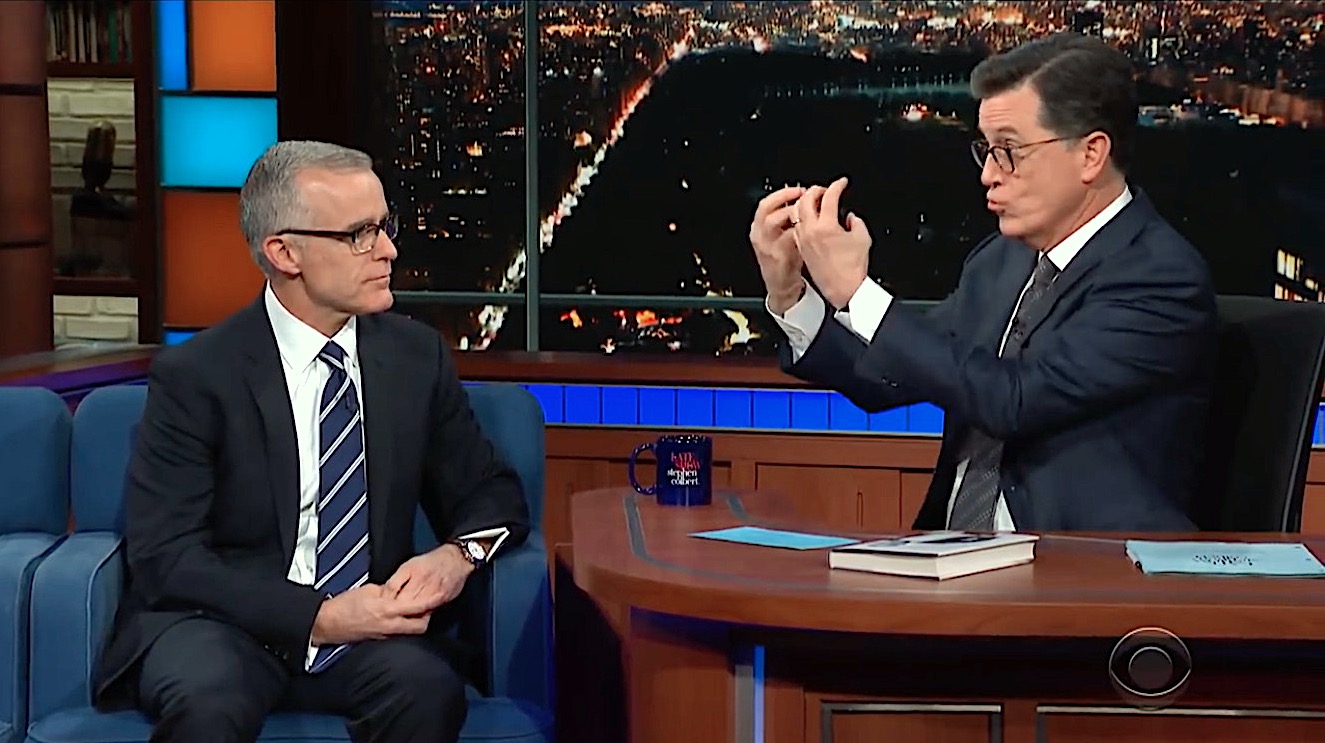Andrew McCabe says Trump's relationship with Russia 'seems to get more suspicious every day'


A free daily email with the biggest news stories of the day – and the best features from TheWeek.com
You are now subscribed
Your newsletter sign-up was successful
Stephen Colbert began his interview with former FBI Deputy Director Andrew McCabe on Tuesday's Late Show with a little lighthearted banter. "Legally, do you have to look and dress like an extra from Dragnet to be in the FBI?" Colbert said. "Yes, of course," McCabe replied drily. Then they jumped into his book, The Threat, and why McCabe launched a dual criminal-counterintelligence investigation into President Trump after Trump fired FBI Director James Comey during the FBI's investigation of Russian election meddling.
The investigation grew out of the question, "Why would the president of the United States be trying to obstruct an investigation into Russia's activity?" McCabe explained. "And what makes you think that the president fired Comey because of the Russia investigation, other than the fact that he said that out loud?" Colbert asked, half-seriously. "There were a number of things that concerned us as we investigated the possibility of Russian collusion with the Trump campaign through the fall," McCabe said, adding, "We don't open investigations because we like someone or don't like them, or because they're a Republican or a Democrat."
McCabe explained that Deputy Attorney General Rod Rosenstein's "brief" mention of invoking the 25th Amendment to remove Trump came "in the middle of a chaotic and long conversation" and "was not very coup-y," and said his former boss Robert Mueller loves managing investigations, "so I am sure he is just as happy as he can possibly be" as special counsel. "He looks happy," Colbert deadpanned. "Is there anything in the last two years that makes you less suspicious of the president, or is less indicative that he had improper relationship with the Russians, possible collusion or conspiracy?" "No," McCabe answered quickly. "It all seems to get more suspicious every day."
The Week
Escape your echo chamber. Get the facts behind the news, plus analysis from multiple perspectives.

Sign up for The Week's Free Newsletters
From our morning news briefing to a weekly Good News Newsletter, get the best of The Week delivered directly to your inbox.
From our morning news briefing to a weekly Good News Newsletter, get the best of The Week delivered directly to your inbox.
McCabe also said the media's reporting on Trump's Russia ties and possible obstruction of justice has been remarkably accurate, but he still knows mildly shocking things he can't discuss. Peter Weber
A free daily email with the biggest news stories of the day – and the best features from TheWeek.com
Peter has worked as a news and culture writer and editor at The Week since the site's launch in 2008. He covers politics, world affairs, religion and cultural currents. His journalism career began as a copy editor at a financial newswire and has included editorial positions at The New York Times Magazine, Facts on File, and Oregon State University.
-
 How the FCC’s ‘equal time’ rule works
How the FCC’s ‘equal time’ rule worksIn the Spotlight The law is at the heart of the Colbert-CBS conflict
-
 What is the endgame in the DHS shutdown?
What is the endgame in the DHS shutdown?Today’s Big Question Democrats want to rein in ICE’s immigration crackdown
-
 ‘Poor time management isn’t just an inconvenience’
‘Poor time management isn’t just an inconvenience’Instant Opinion Opinion, comment and editorials of the day
-
 ‘One Battle After Another’ wins Critics Choice honors
‘One Battle After Another’ wins Critics Choice honorsSpeed Read Paul Thomas Anderson’s latest film, which stars Leonardo DiCaprio, won best picture at the 31st Critics Choice Awards
-
 A peek inside Europe’s luxury new sleeper bus
A peek inside Europe’s luxury new sleeper busThe Week Recommends Overnight service with stops across Switzerland and the Netherlands promises a comfortable no-fly adventure
-
 Son arrested over killing of Rob and Michele Reiner
Son arrested over killing of Rob and Michele ReinerSpeed Read Nick, the 32-year-old son of Hollywood director Rob Reiner, has been booked for the murder of his parents
-
 Rob Reiner, wife dead in ‘apparent homicide’
Rob Reiner, wife dead in ‘apparent homicide’speed read The Reiners, found in their Los Angeles home, ‘had injuries consistent with being stabbed’
-
 Hungary’s Krasznahorkai wins Nobel for literature
Hungary’s Krasznahorkai wins Nobel for literatureSpeed Read László Krasznahorkai is the author of acclaimed novels like ‘The Melancholy of Resistance’ and ‘Satantango’
-
 Primatologist Jane Goodall dies at 91
Primatologist Jane Goodall dies at 91Speed Read She rose to fame following her groundbreaking field research with chimpanzees
-
 Florida erases rainbow crosswalk at Pulse nightclub
Florida erases rainbow crosswalk at Pulse nightclubSpeed Read The colorful crosswalk was outside the former LGBTQ nightclub where 49 people were killed in a 2016 shooting
-
 Trump says Smithsonian too focused on slavery's ills
Trump says Smithsonian too focused on slavery's illsSpeed Read The president would prefer the museum to highlight 'success,' 'brightness' and 'the future'
